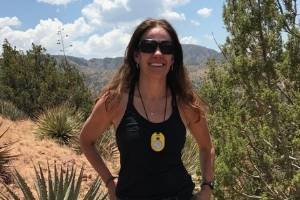 Each year the College of the Environment provides faculty-student research grants to provide faculty and their students an opportunity to conduct research that would not have been otherwise possible. Research in the O’Neil lab is focused on understanding the structure-function relationship of proteins involved in neurodegenerative diseases, specifically ALS. Thanks to a COE faculty-student research grant and a COE summer fellowship, Alison O’Neil, assistant professor of chemistry, neuroscience major Daniel Kulick ’21 and molecular biology and biochemistry & neuroscience and behavior double-major Josephine Park ’22 were able to collaborate on Professor O’Neil’s investigation of the persistent toxicant cis-Chlordane as an environmental trigger of sporadic ALS.
Each year the College of the Environment provides faculty-student research grants to provide faculty and their students an opportunity to conduct research that would not have been otherwise possible. Research in the O’Neil lab is focused on understanding the structure-function relationship of proteins involved in neurodegenerative diseases, specifically ALS. Thanks to a COE faculty-student research grant and a COE summer fellowship, Alison O’Neil, assistant professor of chemistry, neuroscience major Daniel Kulick ’21 and molecular biology and biochemistry & neuroscience and behavior double-major Josephine Park ’22 were able to collaborate on Professor O’Neil’s investigation of the persistent toxicant cis-Chlordane as an environmental trigger of sporadic ALS.
research
student, faculty & faculty-student research
poulos, detre ’22 explore big bend dataset
 Each year the College of the Environment provides faculty-student research grants to provide faculty and their students an opportunity to conduct research that would not have been otherwise possible. Helen Poulos, adjunct assistant professor of environmental studies, and environmental studies & earth and environmental sciences major Ally Detre ‘22 launched a faculty-student research collaboration during the 2020-21 academic year working on a dataset documenting native woody plant recovery in the Big Bend Region of the Rio Grande. Ally received a COE summer fellowship in 2021 that allowed her to gain first-hand knowledge of the area with a trip to Big Bend National Park to resurvey a stretch of the river that experienced recent native riparian plant recovery and to work as a GIS technician for the Science and Resources Management division of Big Bend National Park.
Each year the College of the Environment provides faculty-student research grants to provide faculty and their students an opportunity to conduct research that would not have been otherwise possible. Helen Poulos, adjunct assistant professor of environmental studies, and environmental studies & earth and environmental sciences major Ally Detre ‘22 launched a faculty-student research collaboration during the 2020-21 academic year working on a dataset documenting native woody plant recovery in the Big Bend Region of the Rio Grande. Ally received a COE summer fellowship in 2021 that allowed her to gain first-hand knowledge of the area with a trip to Big Bend National Park to resurvey a stretch of the river that experienced recent native riparian plant recovery and to work as a GIS technician for the Science and Resources Management division of Big Bend National Park.
congrats to our 33 coe summer fellows!
 Every year, the COE awards fellowships to fund summer research opportunities for Wesleyan students across all majors and class years. Introducing our 33 COE 2021 summer (and a few fall) fellows. Read more about their projects, below!
Every year, the COE awards fellowships to fund summer research opportunities for Wesleyan students across all majors and class years. Introducing our 33 COE 2021 summer (and a few fall) fellows. Read more about their projects, below!
Nick Bowman ’23
archaeology
My research will focus on the recreation of ancient cultural and environmental conditions in relation to the cultivation of ancient medicinal plants by drawing on archaeological site reports, coring and shoreline data, geological maps, soil samples, and other source material to contextualize Professor Birney’s chemical findings.
Belle Brown ’22
environmental studies and government
This summer, I will work as a multimedia intern for the Rodale Institute in Kutztown, Pennsylvania, using social media, videography, and photography to share information about organic agriculture. In this position, I will continue to pursue my passion for sustainable agriculture, while also gaining invaluable experience in using multimedia to spread a message that grows increasingly urgent as the climate crisis intensifies.
coe think tank explores habitability

Each academic year, the COE gathers a small group of Wesleyan faculty members, a scholar of prominence from outside Wesleyan, and undergraduate students into a year-long academic think tank on a critical environmental issue. The aim of the COE Think Tank is not only to generate a deeper understanding of the thematic issue, but also to produce scholarly works that will influence national/international thinking and action on the issue. The Think Tank theme for 2020-21 is Habitability: Cosmological, Planetary & Ethical Perspectives.
poulos receives $300k nasa research grant
 Dr. Helen Poulos, adjunct assistant professor of environmental studies, has been awarded a $300,000 NASA grant to examine forest type-conversion through the lens of evapotranspiration (plant sweat) in response to high-severity wildfire in southeastern Arizona. Poulos and her team will conduct their research using imagery gathered by the ECOSTRESS sensor mounted on the International Space Station. It will be the first-ever test of the ECOSTRESS sensor’s applicability for wildfire-related research.
Dr. Helen Poulos, adjunct assistant professor of environmental studies, has been awarded a $300,000 NASA grant to examine forest type-conversion through the lens of evapotranspiration (plant sweat) in response to high-severity wildfire in southeastern Arizona. Poulos and her team will conduct their research using imagery gathered by the ECOSTRESS sensor mounted on the International Space Station. It will be the first-ever test of the ECOSTRESS sensor’s applicability for wildfire-related research.
Plants facing the aftermath of wildfire often have insufficient water, which causes their temperature to rise. The ECOSTRESS radiometer measures the temperatures of plants across Earth to an extraordinarily accurate degree. Poulos’s NASA-funded project will specifically investigate the effects of the 2011 Horseshoe Two Fire on post-fire plant and site water balance and evaluate the potential of using data gathered from the ECOSTRESS sensor to predict wildfire effects on plant community structure and water relations in an Arizona Sky Island pine-oak forest.
think tank explores beyond the human
 Each academic year the COE gathers a small group of Wesleyan faculty members, a scholar of prominence from outside Wesleyan, and a small group of undergraduate students into a year-long academic think tank on a critical environmental issue. The aim of the think tank is not only to generate a deeper understanding of the thematic issue, but also to produce scholarly works that will influence national/international thinking and action on the issue. This year’s Think Tank theme: Meaningful Worlds: Listening and Learning Beyond the Human.
Each academic year the COE gathers a small group of Wesleyan faculty members, a scholar of prominence from outside Wesleyan, and a small group of undergraduate students into a year-long academic think tank on a critical environmental issue. The aim of the think tank is not only to generate a deeper understanding of the thematic issue, but also to produce scholarly works that will influence national/international thinking and action on the issue. This year’s Think Tank theme: Meaningful Worlds: Listening and Learning Beyond the Human.